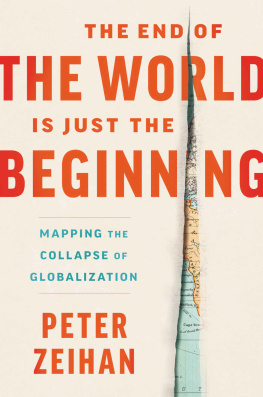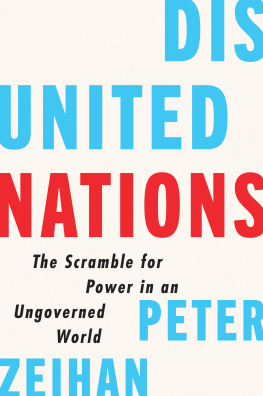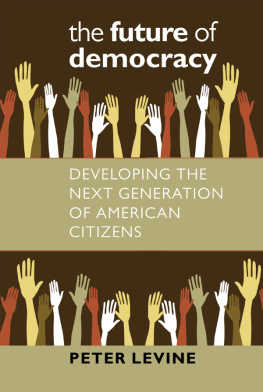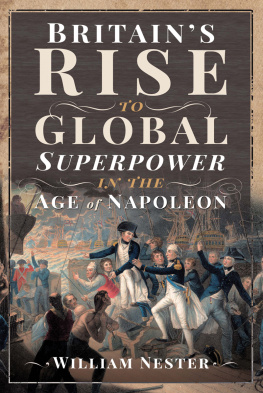Peter Zeihan - The Accidental Superpower: The Next Generation of American Preeminence and the Coming Global Disorder
Here you can read online Peter Zeihan - The Accidental Superpower: The Next Generation of American Preeminence and the Coming Global Disorder full text of the book (entire story) in english for free. Download pdf and epub, get meaning, cover and reviews about this ebook. year: 2014, publisher: Twelve, genre: History. Description of the work, (preface) as well as reviews are available. Best literature library LitArk.com created for fans of good reading and offers a wide selection of genres:
Romance novel
Science fiction
Adventure
Detective
Science
History
Home and family
Prose
Art
Politics
Computer
Non-fiction
Religion
Business
Children
Humor
Choose a favorite category and find really read worthwhile books. Enjoy immersion in the world of imagination, feel the emotions of the characters or learn something new for yourself, make an fascinating discovery.

- Book:The Accidental Superpower: The Next Generation of American Preeminence and the Coming Global Disorder
- Author:
- Publisher:Twelve
- Genre:
- Year:2014
- Rating:5 / 5
- Favourites:Add to favourites
- Your mark:
- 100
- 1
- 2
- 3
- 4
- 5
The Accidental Superpower: The Next Generation of American Preeminence and the Coming Global Disorder: summary, description and annotation
We offer to read an annotation, description, summary or preface (depends on what the author of the book "The Accidental Superpower: The Next Generation of American Preeminence and the Coming Global Disorder" wrote himself). If you haven't found the necessary information about the book — write in the comments, we will try to find it.
The Accidental Superpower: The Next Generation of American Preeminence and the Coming Global Disorder — read online for free the complete book (whole text) full work
Below is the text of the book, divided by pages. System saving the place of the last page read, allows you to conveniently read the book "The Accidental Superpower: The Next Generation of American Preeminence and the Coming Global Disorder" online for free, without having to search again every time where you left off. Put a bookmark, and you can go to the page where you finished reading at any time.
Font size:
Interval:
Bookmark:
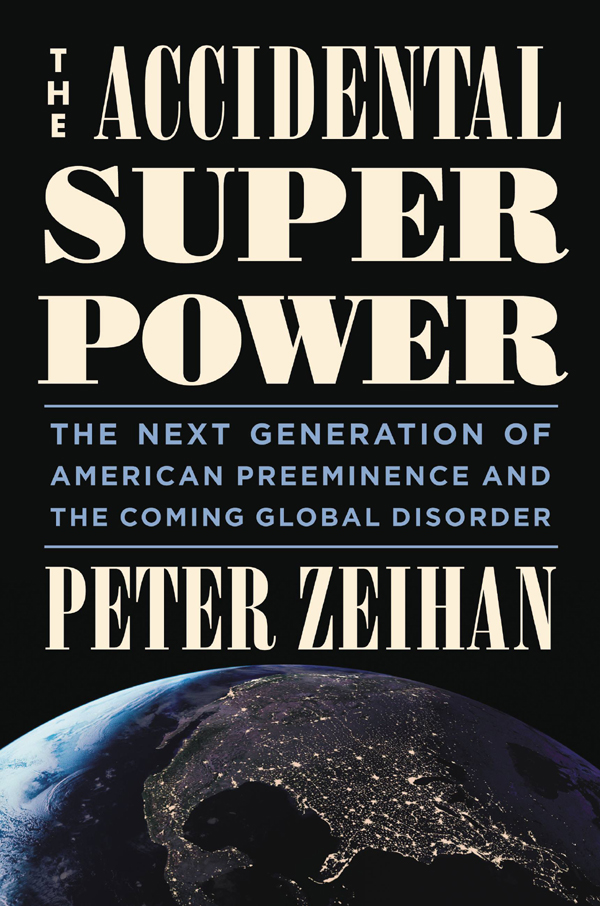
In accordance with the U.S. Copyright Act of 1976, the scanning, uploading, and electronic sharing of any part of this book without the permission of the publisher constitute unlawful piracy and theft of the authors intellectual property. If you would like to use material from the book (other than for review purposes), prior written permission must be obtained by contacting the publisher at permissions@hbgusa.com. Thank you for your support of the authors rights.
To receive special offers, bonus content, and news about our latest ebooks and apps, sign up for our newsletters.
Sign Up
Or visit us at hachettebookgroup.com/newsletters

For more about this book and author, visit Bookish.com.
Copyright 2014 by Peter Zeihan
All rights reserved. In accordance with the U.S. Copyright Act of 1976, the scanning, uploading, and electronic sharing of any part of this book without the permission of the publisher constitute unlawful piracy and theft of the authors intellectual property. If you would like to use material from the book (other than for review purposes), prior written permission must be obtained by contacting the publisher at permissions@hbgusa.com. Thank you for your support of the authors rights.
Twelve
Hachette Book Group
237 Park Avenue, New York, NY 10017
hachettebookgroup.com
twitter.com/grandcentralpub
First ebook edition: November 2014
Twelve is an imprint of Grand Central Publishing.
The Twelve name and logo are trademarks of Hachette Book Group, Inc.
The Hachette Speakers Bureau provides a wide range of authors for speaking events. To find out more, go to www.hachettespeakersbureau.com or call (866) 376-6591.
The publisher is not responsible for websites (or their content) that are not owned by the publisher.
ISBN 978-1-4555-8367-6
E3
To Dad
For everything
Ive always loved maps. My mom tells a story of how when I was five I unfolded a map of my home state of Iowa and started tracing roads away from my hometown, building up to the thickest, brightest line I could find and then connecting it to the next thickest, brightest line I could find until I had traced myself off the maps edge. When I inquired what was on the other side of the Missouri River, my mom realized that Id be leaving Iowa someday.
Map tracing turned into backpacking and route finding, which in time evolved into a mixed-discipline university experience involving everything from Korean land reclamation to Caucasus pipeline planning to German refugee policy to Australian irrigation systems and Brazilian port development. It was all about determining why development strategies that worked so well in one place were disasters in others.
Somewhat ironically, I was almost finished with grad school before I realized that I wasnt the only person to have had such thoughts. In fact, there was an entire discipline based on the concept:
Geopolitics is the study of how place impacts everything: the clothes you wear, the food you eat, the size and serviceability of your mortgage, how long you live, how many children you have, the stability of your job, the shape and feel of your countrys political system, what sorts of war your country wages or defends itself against, and ultimately whether your culture will withstand the test of time. The balance of rivers, mountains, oceans, plains, deserts, and jungles massively influences everything about both the human condition and national success.
Of course, you shouldnt treat geography as deterministic. The Nazis loved geopolitics, but instead of using the study of geography to shape their policies, they used it to justify their ideology. They were hardly alone. Throughout the eighteenth and nineteenth centuries Europeans of all stripes used the subdiscipline of geographic determinism to assert their cultural and intellectual superiority over the rest of humanity. At one point, geographers as a whole realized that such concepts were, well, hugely racist and the study of political geography in most formsparticularly in the United Stateswas largely abandoned.
There is definitely a baby/bathwater issue here. There are good solid reasons as to why nearly every major expansionary power of the past has been based in a temperate climate zone, and why all those that have lasted have been riverine-based. This doesnt make the people of these zones better or smarter. It simply means they have more and more sustainable resources, fewer barriers to economic development, and economic and military systems that allow for greater reach. The trick is to begin with geography and see where it takes you; dont start with a theory and use geography to justify it. Its a strategy that has served me well in my life as an analyst, and one that I have attempted to apply to everything I study.
This means that I often find myself drawing conclusions I find unsettling. My personal ideology is green and internationalist and libertarian, which means Im an idealistic pragmatist who falls asleep during long meetings. Aside from a few snarky footnotes that bravely survived the editorial gauntlet, my ideology is not represented in this book. I have solar panels on my house, but I see a global future in which coal reigns supreme. Im an unflinching supporter of free trade and the Western alliance network, seeing the pair as ushering in the greatest peace and prosperity this world has ever known. Yet geography tells me both will be abandoned. I prefer small government, believing that an unobtrusive system generates the broadest and fastest spread of wealth and liberty. But demography tells me an ever larger slice of my income will be taken to fund a system that is ever less dynamic and accountable. I am not required to savor my conclusions. This isnt a book of recommendations on what I think should happen. This is a book of predictions about what will happen.
At its core, The Accidental Superpower is about the advantages and disadvantages that geography imposes. How such characteristics interact to create the world we now know. How fluctuations in those interactions are about to turn that world on its ear. How the most powerful state of the ending era will evolve into something far greater in the new.
Without further ado, lets get to the heart of the matter.

O n July 1, 1944, 730 delegates from the forty-four Allied nations and their respective colonial outposts convened at the Mount Washington Hotel in the skiing village of Bretton Woods, New Hampshire, with a mission to do nothing less than decide the fate of the postwar world. The scores of luminaries included high-ranking bankers, economists, government ministers, and the future leaders of Canada, France, Greece, New Zealand, and Peru. They had trained in overnight from Atlantic City, New Jersey, and were greeted by a sprawling resort in disarray: Many of the rooms lacked running, potable water; there wasnt enough ice or Coca-Cola to go around; staffing was so thin that some nearby Boy Scouts had to be drafted; and the establishments manager locked himself in his office with a case of whiskey and refused to come out. This couldnt have been how the conferences organizers and lead delegatesHarry Dexter White of the United States and Lord John Maynard Keynes of the United Kingdom, whod been discussing and planning the conference for nearly three yearshad imagined the opening days.
Font size:
Interval:
Bookmark:
Similar books «The Accidental Superpower: The Next Generation of American Preeminence and the Coming Global Disorder»
Look at similar books to The Accidental Superpower: The Next Generation of American Preeminence and the Coming Global Disorder. We have selected literature similar in name and meaning in the hope of providing readers with more options to find new, interesting, not yet read works.
Discussion, reviews of the book The Accidental Superpower: The Next Generation of American Preeminence and the Coming Global Disorder and just readers' own opinions. Leave your comments, write what you think about the work, its meaning or the main characters. Specify what exactly you liked and what you didn't like, and why you think so.

